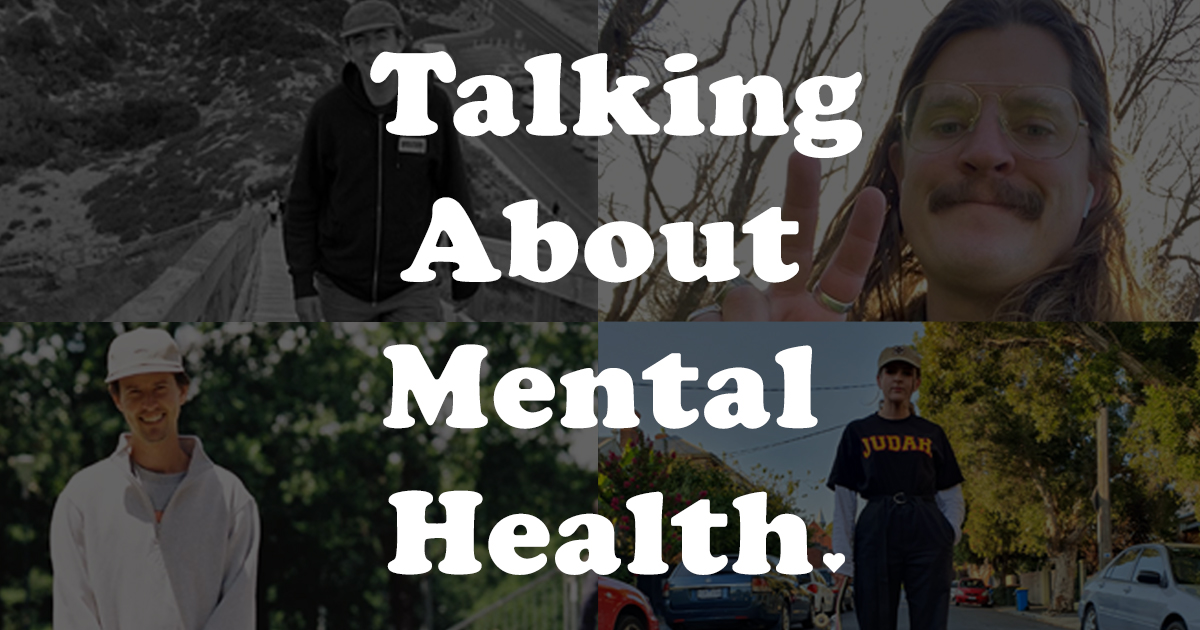
Talking about Mental Health Pt. 1
Right now, more than ever, we are realising how important it is to be aware of, and take care of our mental health and look out for those around us. We took some time to talk with our friends Tim and Gorm to share their experiences, perspectives and have some honest conversation around mental health. We are proud to share these with you all in the hopes of creating more conversations within our community, reduce stigma around mental health and to look out for each other for a long time to come. #MentalHealthMatters
A majority of people at some point in their lives have either suffered from mental illness or known someone suffering. Whether mild cases or more extreme, it has significant effects on those suffering, those around them and the community as a whole. But why do we still find it so hard to talk about?
We are blessed to belong to the skateboarding community that has had an extensive history of creating bonding relationships, good times, creative outlets, physical health and at times being an escape from some of the difficulties we have in our lives. Despite our community having all these things it is important to acknowledge that we are far from free of the effects of mental health issues and, like many other groups, still have a lot of difficulty openly discussing how we really feel. Now, more than ever, as our community is forced to remain physically apart, we need to talk about how we are feeling, create a dialogue for our emotions and find new ways to bring each other together.
Too many of us have been directly affected by these issues and we at Fast Times want to create some conversation around mental health in an attempt to reduce the stigma around these issues, increase awareness and make more members of our community feel comfortable to talk about their feelings.
Although we are no experts on the topic, we have reached out to several members of the skateboarding community to share their experiences, perspectives and to create some conversation. We understand this does not give every single perspective and there will always be more points to discuss however we hope this is a good start.
For those of you out there struggling with mental health issues or if you think you know someone who might be struggling, please reach out, have a conversation or simply listen, so we can be there for each other for a long time to come.
Tim Bonaldi
If you skate in Melbourne you’ve surely run into Tim. Best known for filming several videos and parts over the years, some of which you may have seen in our Melbourne store, and always being out in the streets having fun with his friends.
What some may not know about Tim is that he is a registered psychologist and spends his working days seeing clients and working with other services to help manage their mental health needs to achieve a better quality of life. Although he doesn’t look like your stereotypical psychologist he understands the challenges in managing mental health issues and how to work through them. He’s currently working on developing his own psychology private practice to continue to provide support for those who need it.
How important is it to talk about your own mental health?
Talking about your own mental health is extremely important, and that’s not just for some, that’s for all of us, even psychologists. Psychologists are required to have supervision, where you can discuss any challenges in relation to the work you may be having. My previous workplace was great, I had weekly supervision with my colleagues and private supervision every fortnight. If we were having our own personal challenges with mental health, we were encouraged to reach out, and see a psychologist ourselves. It was a very supportive environment.
Who would you encourage people to reach out to if they’re struggling and need to talk?
People’s experiences with mental health are always different. Some people may feel most comfortable reaching out to family or friends as a first step. Others may prefer to call a service/message them online, or go straight to their GP for a mental health care plan and referral to a psychologist.
I would encourage people to reach out to someone who they feel comfortable with sharing whatever is on their mind. If your mental health is impacting on your ability to get through the days, and you’re having a hard time coping, then I would recommend speaking to a GP and seeing what options for support are available to you. There are always options!
This year has had a lot of challenges for a lot of people. What are some things you’ve done or seen people do to deal with these challenges during this time?
It has been an incredibly challenging time this year. Things are still constantly changing, so the challenges keep changing too. This makes it so hard to settle in and find your feet. Coming from a very active lifestyle myself, where I was constantly on the go, I personally have tried to challenge myself to embrace this slower pace of living. I have been staying creative by going through footage and editing old clips, playing around with making some music, and also doing a little bit of painting at home.
I’ve found going for walks and skating at some local netball courts to be really helpful in managing the current situation. There is so much research on the importance of physical exercise in managing mental health and how beneficial it is in helping to manage depression, anxiety, stress, and more. Skating for me is also a form of active meditation, it helps you stay present in the moment. It’s hard to try tricks if you’re thinking about something else.
I have seen so many amazing things people are doing to help manage in these times. I’ve seen a man in his late 70’s gliding around on rollerblades (doing all sorts of spins), I’ve seen kids and parents learning to skate, people making music, people making art, people making furniture, people making different things to skate, people coming together over zoom calls, and the list goes on! Being a part of the skate community is great, because everyone is creative in their own ways. There’s never a shortage of inspiration!
What are some things we can look out for in our friends, and even ourselves, that they/we may be having trouble with drugs and alcohol?
Drugs and alcohol are commonly used to mask mental health issues. There is a heavy normalization of this in Australian culture. What I feel contributes to this are constructed ideas around being happy and experiencing “negative” emotions. When people feel “negative” emotions it is often seen as a direct threat to their happiness, and this can trigger an internal struggle. Alcohol and drugs often mask whatever uncomfortable or “negative” feeling you might be experiencing, and this then gives a false sense of normality. It may provide some relief, however it can exacerbate issues, or bring on new ones. By masking this feeling, the real issue is avoided. It’s similar to putting a bandage on an open wound. It’s a bit easier than going to get it checked out, and you may not be able to see the wound anymore, but it’s more likely to become infected and not heal.
Seeing the signs that someone is struggling with their mental health is often really hard. Some people might be quite high functioning with their challenges, and signs may never be seen. We can only ever do our best in seeing the signs, and it’s important you don’t beat yourself up over missed signals.
Drinking/drugs may be a problem if friends and family are showing concern for you, mood fluctuations with feelings of irritability, paranoia, extreme or irrational ideas, risk taking behaviours that are out of character, starting not to care about themselves or loved ones, feeling detached from life, suicidal thoughts, struggling to get work done, day-to-day tasks are becoming difficult to manage, drinking or taking drugs when feeling bored or stressed is becoming more frequent, starting to use earlier in the day than usual, and cutting back on usage doesn’t seem achievable.
Negative experiences will always occur in life, and it’s how you remain flexible in responding to them which is important. It’s really good to have a toolkit of coping strategies and if alcohol or drugs are your main tool, then it may become problematic for you. It’s like going on a 3-month skate trip, and only bringing one board, it’s not likely to work out in your favour.
How can we help our friends/family feel comfortable enough to talk about mental health?
Unfortunately stigma does exist around seeking help and there has been quite a heavy taboo of sharing vulnerabilities in society. I feel this is beginning to change, and it’s moving in a more positive direction. Sharing vulnerabilities is human, and it definitely doesn’t make you a weaker person. Sharing vulnerabilities needs to be normalized, and validating people’s experiences needs to be more common.
Providing friends and family with a safe space to do this is really important. I feel we can help our friends and family feel comfortable to speak about mental health by leading by example. Even just checking in more regularly by asking questions like “How was your day?” “How are you managing everything at work/university/school at the moment?” “Is there anything I can do to help make this week a bit easier for you?” These kinds of questions help normalize the day-to-day struggles we might face, and this helps to make reaching out for support that little bit easier.
What are some signs to look out for to encourage someone to speak up and talk about their feelings?
Some signs to look out for are if the person appears overly stressed every day, they might be using unhelpful coping strategies to manage (such as drugs, alcohol, or avoidance). If they don’t appear to enjoy activities they usually did, they appear erratic, they may be acting out of character, they may be overly negative about themselves or the world and argumentative, they may be disengaging from friends or family, and they might have a lack of hope for the future.
You can help someone by checking in with how they are feeling, and asking what would be helpful for them at this moment. Unless there is a crisis, it’s usually best to start small with suggested plans of help. If someone is experiencing suicidal thoughts, it’s often best to be gentle and supportive. Ask them what is on their mind, and listen. You could then help them consider options, and encourage them to contact LifeLine on 13 11 14.
How can a community, such as we have in skateboarding, support those struggling with mental health issues?
I feel it is really important for communities to come together and help support each other. The skate community is quite close, and some barriers that may have existed before are starting to come down. Continuing to break down these barriers helps foster a more positive environment, where mental health issues can be supported. To make lasting change, old systems have to be redeveloped. What better way to start than with our own small system of skateboarding?
Helping people as a community comes down to individual input, so asking those day-to-day questions we spoke about earlier, and treating people with kindness is a great starting point. If you are remaining non-judgmental, and open to supporting others, it’s more likely to have a trickle effect through the community.
A lot of kids look up to certain skaters. If those skaters are setting a good example of how to interact with others, it’s likely to have a positive impact on those kids. I’ve seen a massive push for community and systemic change lately, which is absolutely great, however without individuals doing the groundwork, and setting the examples for the change they want, the system won’t budge.
Skateboarding challenges what is often seen as “normal”. This can definitely be used to help challenge stigma, break down barriers that hold people back, and lead the way for wider change.
Tom ‘Gorm’ Lillingston
Supporting someone can often be incredibly difficult and often very tough to navigate as a friend. Gorm, like many of us, has seen his friends and those around him struggle with mental illness and sadly some of those friends are no longer with us. Ben Raemers is one of those friends, who’s passing last year was a huge shock to his friends, family and the skateboarding world as a whole. Having had these experiences he has become much more aware of himself, his own mental health as well as those around him. As a friend and staff member of Fast Times we are proud to give him a platform to share his point of view. His views are from his own experiences, and are by no means professional in nature.
Can you give us a bit of a back story on your experiences with mental health.
Well this could get sombre quick. Well I guess my first ever realisation that mental health was a factor in life was when my close friend James Mills suffered a severe anxiety attack in a busy London underground station, and he just up and left. Even then when I knew something was up, my friends and I at the time didn’t actually say ‘I think Mills is suffering with mental health problems’, we just assumed he was having a bad day. The months and years following that incident with James was the real eye opener that really made me realise the struggles that he and many other people face with mental health. Unfortunately we lost James to a drug overdose in 2017 but without a doubt he was the most open person to talk with about anything and left no holds barred when it came to talking about mental health. His open honesty in talking about it was probably the greatest help to himself as well as myself and the people around him in trying to understand his and others mental health problems.
Ben was another childhood friend who suffered with mental health problems, the difference is, he didn’t speak about it. From a young age he was in skateboardings limelight, and life seemed pretty damn breezy. Yeah he would complain about things, but don’t we all?! And yeah he would have a bit too much to drink, but we've all done that. Ben and I did talk about the struggles of life and we would be there to pick each other up, but never did I or anyone close to him know how much he was truly struggling. Even when there was the slightest glimmer of depression or sadness through his normal happy go lucky self it would be quickly covered up and maybe unnoticed.
Similar to Mills and Ben I have other friends in my life who struggle with mental health problems, some of them do speak about it, and that’s fine with me. Some people don’t want to talk about it, and that’s fine too. But I seriously do encourage people to talk about it if they can, from my own experience it does far more good than bad. Awareness isn’t careless.
Do you have some tips for those struggling with their own mental health issues?
Talk to someone about it. Talk to family and friends, a professional or a helpline. It can seem very daunting to talk about it but once you do, it can sometimes blow that door off its hinges and can get the ball rolling that could seriously help you and others around you.
I feel it’s really important to know within yourself when you feel good, try and recognise that as a positive, and work out what got you there. Similar to that point, next time you struggle with your mental health and begin to feel somewhat better, remember that moment, as inevitably you may struggle again in the future but you can draw from your previous experiences as a reminder that it does eventually get better.
I think it’s also very important to get to know yourself, learn what makes you happy, realise what makes you a great person and try not to compare yourself to others as much. If you can learn what makes you happy and become your own person not only does that mean you make yourself happier but it makes you your own individual. It can often be your own perception of what you think you should be and should be doing that gets in the way of you being yourself and doing what you want to do. Taking some time out can lead you to become yourself, a great INDIVIDUAL in a world of many individuals.
Who would you encourage people to reach out to if they’re struggling and need to talk?
Whoever you feel comfortable talking to at that time. Sometimes I’ll talk with my girlfriend, sometimes my housemate, sometimes my friends, sometimes people I work with, and sometimes complete strangers. Sometimes it’s not the person you talk to that helps straight away, but simply the act of talking out loud to someone is the first step.
I understand reaching out and talking to people is ironically easier said than done, but trust me when I say that if you talk to people, they will listen and it will help.
This year has had a lot of challenges for a lot of people. What are some things you’ve done or seen people do to deal with these challenges during this time?
Mate, I know there’s been a lot happening this year, but also, wow there’s been a lot of opportunity to be creative right now and take time for yourself. People are stuck inside for months there’s only so much Instagram, Facebook and Twitter you can look at. Get off the phone and give yourself some time. We all know the world is getting faster, everything we do is getting quicker and quicker. We used to take our time to take pictures and get them developed, take our time picking a movie from the local video store, take our time flicking through a magazine or reading a book, the list goes on. But a lot of us have all had so much time this year away from normal life, that I would encourage you to use your time and appreciate your time how you want to.
Honestly, as well as taking time to myself I have set myself goals throughout all of this, I just write a list of things I want to do, and it sounds kinda cheesy but it does feel real good when you get them done. I think we all wish the problems would just go away, but unfortunately it’s not that easy, but perhaps if you can find something you want to achieve you will start to outweigh the current negatives with some new positives.
How can a community, such as we have in skateboarding, support those struggling with mental health issues
The community side of skateboarding, that to me is the part I love! It’s the skatepark, or the meetup spot, it’s the cheering on of someone who has finally won the battle against a trick, it’s the side of skateboarding that helps you meet new friends, and have fun times, and to learn about others.
I feel that there have been major changes in skateboarding in the last few years and it is improving, just like these conversations, it’s a step in the right direction. I think everyone who is a part of the industry of skateboarding has a responsibility to set a good example as our actions are mirrored by young kids who grow up to be adults. That goes for the head of a shoe company down to someone like myself working in the shop. Look at people like Reynolds or Ellington talking about their own struggles, it opens the doors and creates awareness for that next generation which is so important!
I would be so stoked to hear that someone was talking about their issues with their friends because they heard their favourite pro or whoever in the community they look up to had spoken about similar issues and that it’s not always about kickflipping that 15 stair and getting that fresh new hoody. I feel the emphasis on being ‘cool’ in skateboarding sometimes outweighs the need for having fun and being yourself, and I hope that can change.
What are some signs to look out for to encourage someone to speak up and talk about their feelings? How can you do this?
I guess there are many signs that you can see that might make you think someone’s struggling with mental health. Sometimes there are the obvious physical signs, such as visible sadness and depression, self harm, excessive drinking, drug addiction, and many more. Some signs are harder to pick up on, and can only be learnt with experiences or from knowing a person, such as realising they may have become more reclusive or quiet than they usually would be, a person becoming more reserved in conversation, or acting out how you may not expect. It’s a real hard one to know when to talk to someone and sometimes there just aren't any clear signs. What you can do is always simply ask someone how they are, if you feel they might not be being honest don’t push them too hard, but remain aware and continue to encourage conversations, you will know when the time is to encourage someone to open up. I truly feel there are no hard fast answers to these problems. I personally don’t approach all my friends with the same methods to get them to talk about their feelings, but they always know I’m here when they want to talk. At the very least, if a person feels they have someone to talk to, at least they feel they have something. Oh yeah, and tell your friends you love them!
There is no quick fix to the issues of mental health in our community but it all starts with the conversation. It is up to each of us to look out for one another, identify the signs, ask the questions or simply give your full attention when someone is reaching out to you. By being proactive, showing love first and creating a safe space to share our vulnerabilities we can break down some of the barriers and stigma around mental health. It’s okay to be vulnerable and ask for help.
This article and the contributions from each interviewee are from personal perspectives and experiences and do not constitute professional advice. Below are a list of resources you can access to further learn about mental health, what you can do to support, how you can talk about your feelings and who you can reach out to if/when you need to. If ever you feel you don’t know who you can talk to, we also have a list of organisations you can get in touch with at any time. Never be afraid to reach out, you are not alone.
Stay Safe and Take Care of Each Other.
Love,
Fast Times
Check out Part 2 of this article here.
Support Services
- Beyond Blue: 1300 224 636 (https://www.beyondblue.org.au/)
- LifeLine: 13 11 14 (https://www.lifeline.org.au/)
- Kids Helpline: 1800 55 1800 (https://kidshelpline.com.au/)
- Headspace: 1800 650 890 & eHeadspace (online and telephone support) (https://headspace.org.au/)
- MensLine Australia: 1300 789 978 (https://mensline.org.au/)
- Suicide Call Back Service: 1300 659 467 (https://www.suicidecallbackservice.org.au/)
- 1800 RESPECT (violence and abuse support) – 1800 737 732 (https://www.1800respect.org.au/)
Education
- ReachOut (https://au.reachout.com/)
- Headspace (https://headspace.org.au/)
- Kids Helpline (https://kidshelpline.com.au/)
- The BRAVE Program (https://brave4you.psy.uq.edu.au/).
- Black Dog Institute (https://www.blackdoginstitute.org.au/resources-support/)
- R U OK? (https://www.ruok.org.au/)



